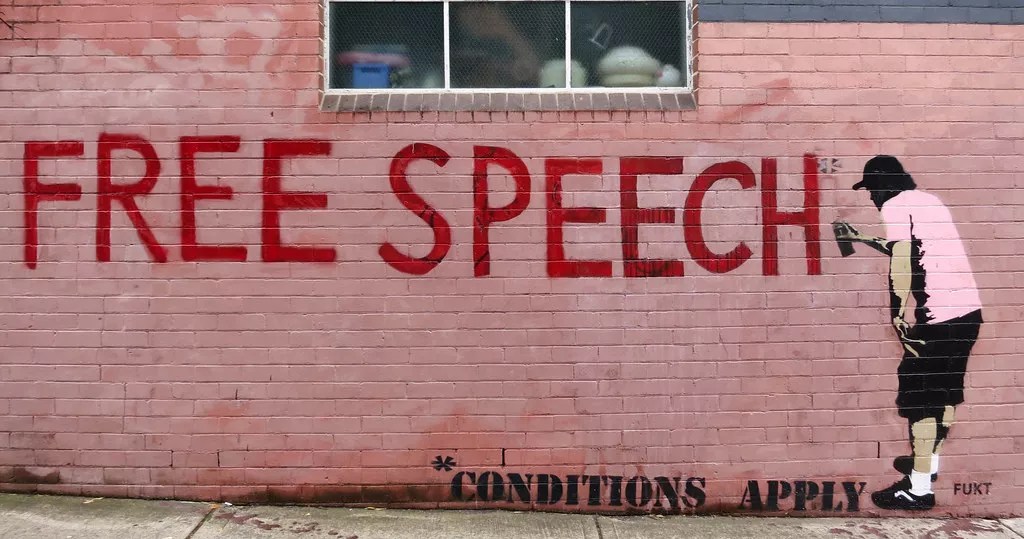
“Free Speech * Conditions Apply by Fukt” by wiredforlego is licensed under CC BY-NC 2.0

Audio By Carbonatix
A divided Supreme Court on Tuesday blocked a Texas law that would prevent large social media companies from banning users and removing content that expressed viewpoints the companies don’t like.
The 5-4 decision temporarily stopped any action under Texas’ HB 20, passed with overwhelming GOP support and signed by Gov. Greg Abbott in September. In the meantime, lower courts will continue work on a lawsuit filed by Netchoice, an industry group working on behalf of social media companies including Twitter and Facebook.
The law was driven by anger over what GOP leaders see as liberal bias in the companies’ decision to ban content and users expressing conservative points of view.
Chief Justice John Roberts was joined by Justices Stephen G. Breyer, Brett M. Kavanaugh, Amy Coney Barrett and Sonia Sotomayor in reinstating a temporary injunction issued by a district court but stayed on appeal by the 5th U.S. Circuit Court of Appeals. The majority didn’t offer an explanation of its reasoning.
Three other conservative justices – Samuel A. Alito Jr., Clarence Thomas and Neil M. Gorsuch – and liberal Justice Elena Kagan opposed reinstating the injunction.
“Social media platforms have transformed the way people communicate with each other and obtain news,” Alito wrote in a dissenting opinion joined by Gorsuch and Thomas. “At issue is a ground-breaking Texas law that addresses the power of dominant social media corporations to shape public discussion of the important issues of the day.”
Underlying the case is a question of what social media companies are, exactly. Are they more akin to traditional newspaper publishers and thus protected by the First Amendment from government diktats about what they publish? Or are they, as Texas Attorney General Ken Paxton contends, more akin to a telegraph or telephone company, or a public square, where the state has greater leeway to act to ensure equal access to all?
Neither analogy is perfect, said attorney W. Scott McCollough, who filed an amicus brief supporting the law on behalf of The Babylon Bee, a Christian-themed satiric website, and others.
“These platforms are not like newspapers at all. They’re a completely different animal,” McCollough said. Neither are they the same as telephone companies and other “common carriers” that simply pass messages along.
HB20 would prohibit social media platforms with at least 50 million monthly users from blocking, removing or “demonetizing” content based on the users’ views, according to the website SCOTUSblog.
The law would also require the companies to provide an “acceptable use policy” and “a biannual transparency report” to give users a clear understanding of what content might be blocked and create procedures that would allow users to appeal any decisions to remove content.
Adding to the complexity of the question is the federal Communications Decency Act, which shields social media companies from being sued for libel for content created by their users while encouraging the companies to remove obscene and other indecent material.
Newspapers, magazines and other news media aren’t afforded the same protection from defamation lawsuits, but they also can’t be told by the government whom or what they must publish.
McCollough said the companies are “trying to argue on both sides of the equation,” claiming the rights of publishers without the burdens.
The Texas law’s supporters contend it is intended to be content neutral while preventing consumers reliant on social media from losing access for reasons that are opaque and arbitrary.
“As a society and, I guess, a country, we’ve got to figure out what they are. … We’re going to have to come up with some sort of compromise here,” McCollough said.
Transparency is key, especially if it encourages competitors to challenge the dominance of the social media giants. Otherwise, we might avoid government meddling in the marketplace of ideas but end up ceding that same power to corporations with their own secret, unregulated agendas.
While the Supreme Court’s decision is a setback for HB20’s supporters, McCollough pointed out that as the case continues, the public is likely to get more information about how these companies decide what viewpoints aren’t welcome and expose their biases.
“This is not over,” he said, and Alito’s opinion suggested the same.
The district court’s decision to grant the preliminary injunction originally and the Supreme Court majority’s decision to reinstate while the 5th Circuit writes its own opinion were premature, the justice wrote.
“I reiterate that I have not formed a definitive view on the novel legal questions that arise from Texas’s decision to address the ‘changing social and economic’ conditions it perceives. … [But] Texas should not be required to seek preclearance from the federal courts before its laws go into effect,” Alito wrote.